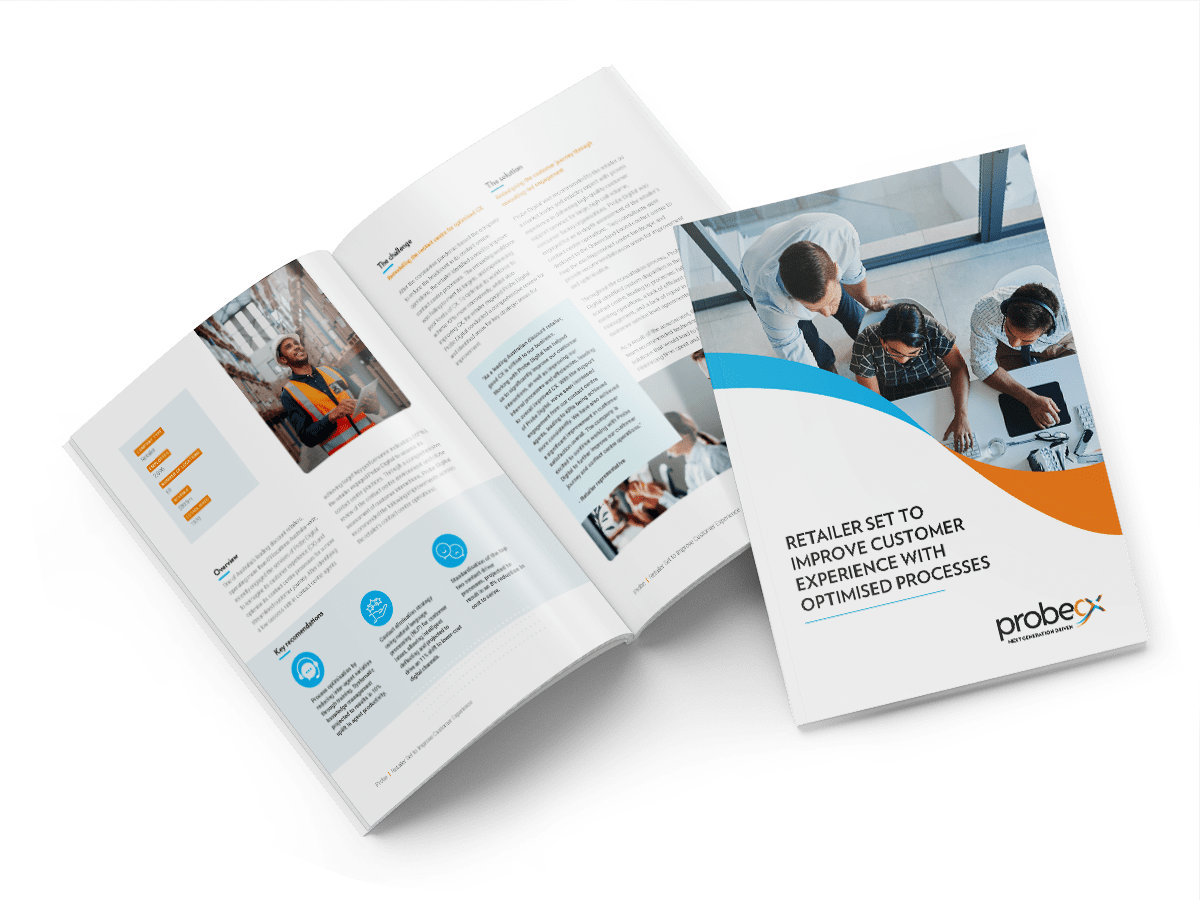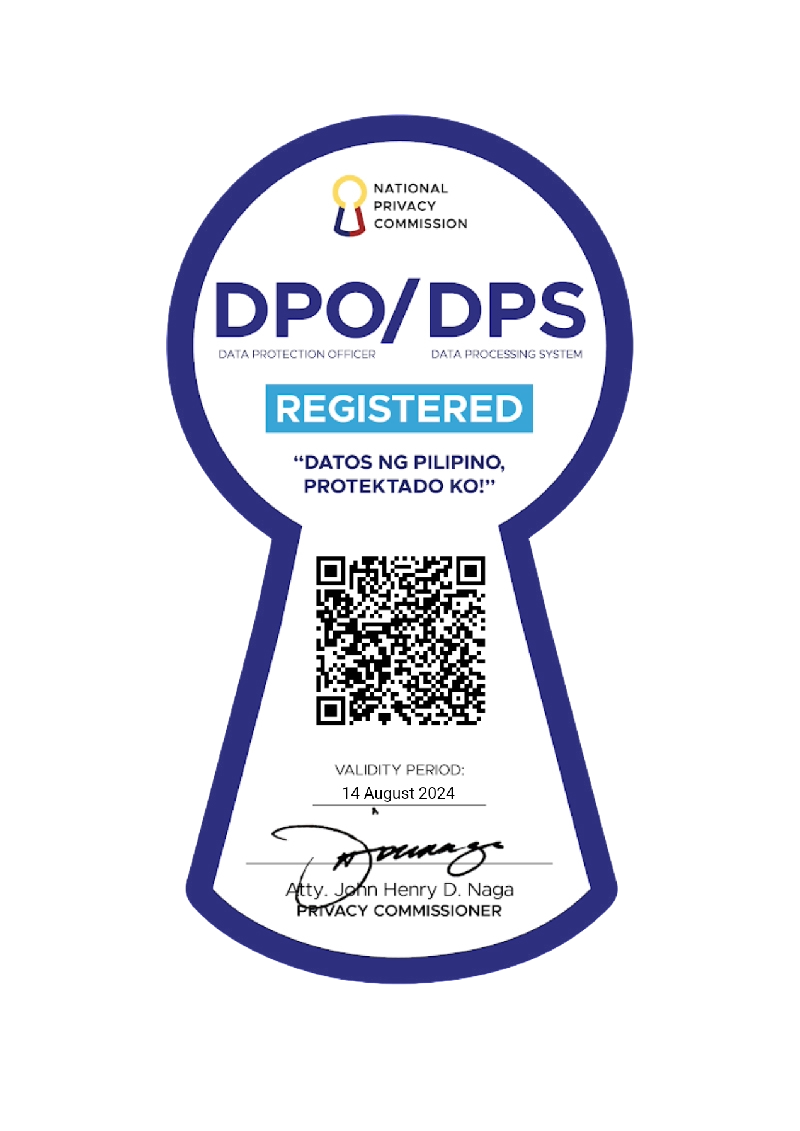-
About Us
Probe CX is a tech-powered, global customer experience organisation that amplifies human capabilities with technological excellence.
-
Vision and Culture
We help our clients become modern digital organisations by combining the latest technology with people, process and data.
-
Executive Team
Meet the team with unmatched experience committed to helping organisations create environments for digitally-enabled CX to thrive.
-
Compliance
Industry-recognised certifications to protect what matters most to our clients and their customers.
-
Locations
Over 19,000 team members delivering exceptional customer experiences across five countries.
-
Reasons to choose Probe CX
The top nine reasons to get more closely acquainted with Probe CX.
TECHNOLOGY & TRANSFORMATION SERVICES
 Creating exceptional customer experiences by 'doing it better'
Creating exceptional customer experiences by 'doing it better'
Optimise your customer experience by designing, deploying and managing digital solutions customised to your unique needs.
Continue reading- Blog
- The impact of The Great Re-Evaluation
The impact of The Great Re-Evaluation

In this blog, we discuss the connection between The Great Re-Evaluation and its predecessor, The Great Resignation and the impact the former is still having on organisations globally.

The Great Re-Evaluation vs The Great Resignation
There were four key factors that spurred The Great Resignation according to Dr.Klotz:
- Resignation backlogs from employees who, pre-pandemic, were going to resign, but reconsidered due to COVID-19’s impact on the job market.
- Significant burnout issues as related to the pandemic’s pressure on employee performance, specifically in the retail, healthcare and hospitality sectors which were the greatest affected.
- Working from home had people reassess their ideal work-life balance, what it looks like for them and whether their employers were appreciating their work efforts during a trying time.
- Remote work became comfortable and had more benefits, such as less commute time and quicker log offs to be back at home with family.
Statistically speaking, in February 2022, 934,000 million Australians left or lost their job. Of those that left, 330,000 did so because they wanted a better job or wanted change, while 274,000 lost their job involuntarily. October 2021 figures from LinkedIn showcased a 26% jump in employees changing employers when compared to similar data in 2019.
So where does The Great Re-Evaluation come into this? Well, think of it this way. The Great Resignation is predominantly centred on employees ‘resigning’. The Great Re-Evaluation is more focused on employees 're-evaluating’ where they want to work, how they want to work and what they want from the organisations they work for. This is starting to spur a trend of employee bargaining power when it comes to negotiating the way they want to work moving forward. But the re-evaluating term shares its concept across both employees and employers. This phenomenon is forcing organisations to also re-evaluate their employee experience and employee value initiatives or risk not appealing to them anymore.
The Great Re-Evaluation isn’t a concept that should have organisations worried or spark fear. Instead, leaders and managers should view it as an opportunity to consider better change management practices that remove what is no longer serving their current workforce.

What does The Great Re-Evaluation teach us?
First things first: remote or hybrid work isn’t going anywhere. In a study completed by The Becker Friedman Institute for Economics, 30% of people claimed they were more engaged and productive when working from home. They also found a drop in commute times by 62.4 million hours per day just by working from home. Biteable also completed a study which found that in comparison with the 37% of employees who feel more productive in the office, 63% felt more productive working from home.
Reconsider what a ‘traditional’ workspace means with the keyword being ‘flexibility’. Instead of having a one size fits all approach to working requirements, try and have your managers consider the individual work efficiencies of your teams. What working hours do THEY feel most efficient or productive? You may find that one is happier and more productive working the usual 9-5 or 8-4 work time, while another would have a better work-life balance splitting their hours throughout the day so they can take their kids to and from school stress-free.
Get your leaders to sit down with their teams and understand what each employee values and offer that work flexibility to achieve this. In a contact centre environment, as an example, you may find some employees prefer to work the night shift cover or would like their rosters split with one week early shifts, one week late and so on. Once you list down your team's availability, it’s easy to start plotting in shifts, filling gaps all while easily keeping employee satisfaction at a high. You will not only see efficiency gains but improve overall employee experience as well.
Consider a revamp of your organisation's values and culture. Forbes defines a good leader as someone who isn’t about results and sales and more customers. Being a good leader means caring about people.” This ‘caring’ they mention isn’t as simple as a “how was your holiday?” or “how has your week been?” question every now and then. Employees want to feel heard and comfortable speaking about their strengths, concerns and ways to work more efficiently which leads to higher employee motivation levels.
In a way, they want to feel like what they do and the output they give out is making some type of difference and that it matters. This could be as easy as offering free mental health consultations, having one-on-ones with employees-managers each week to touch base on more projects AND job satisfaction. 54% of employees who feel comfortable approaching their leader with a query of any kind were more engaged, according to a study by Gallup.

How can Robotic Process Automation or RPA improve the employee experience?
Over 70% of organisations have reported negative financial impacts as a result of staff turnover. This makes the need for better employee retention strategies which falls primarily to an organisation's HR and recruitment teams. The re-evaluation required to survive the great resignation involves a look at possibly reinventing where people work, how they do their jobs and the entire recruitment process. HR and recruitment leaders have had to navigate a generation’s worth of change in less than two years and while some have relished the challenge, others are no doubt weary from the load they have had to carry. Fortunately, help is at hand and it comes in the form of Robotic Process Automation (RPA), one of the greatest opportunities to sweep the business world in decades.
Related Articles
Intelligent Automation
The future of AI driven conversations
How will conversational AI will reshape service delivery from every angle?
Technology
RPA in finance and accounting - a digital transformation
The finance and accounting sector is burdened by repetitive and time-consuming tasks, which is why robotic process automation is ideal...
Shared Services
Probe CX navigated the COVID-19 work-from-home debate.
Following the Contact Centre Week interview, Probe CX's CEO Andrew Hume discusses the work-from-home mobilisation of its global organisation and what it means for the future of work.
© Copyright 2024 Probe CX | All Rights Reserved
Privacy Policy | Financial Hardship Policy | Whistleblower Policy | Complaints Procedure | Supplier Code of Conduct | Make a Payment | Client Login





